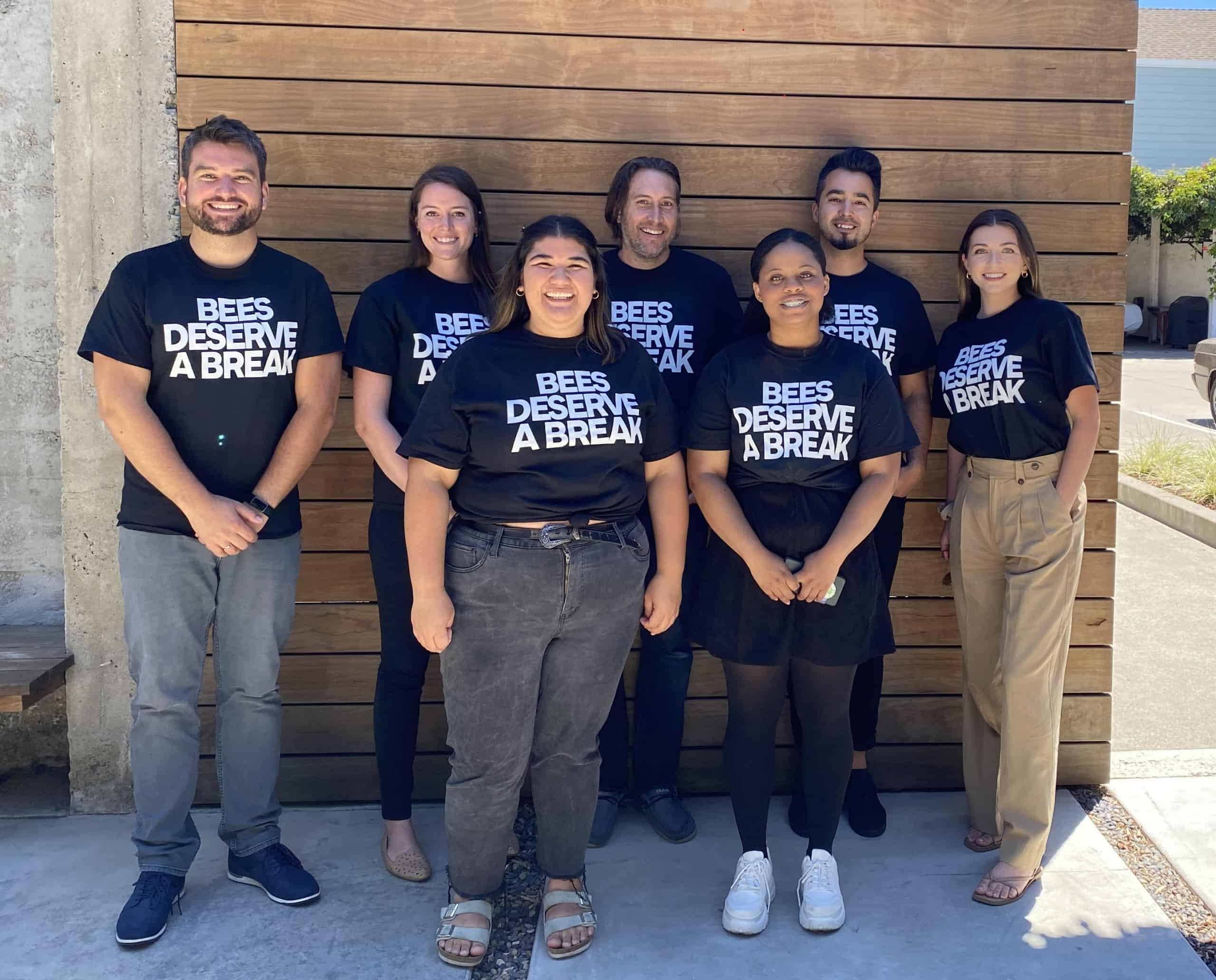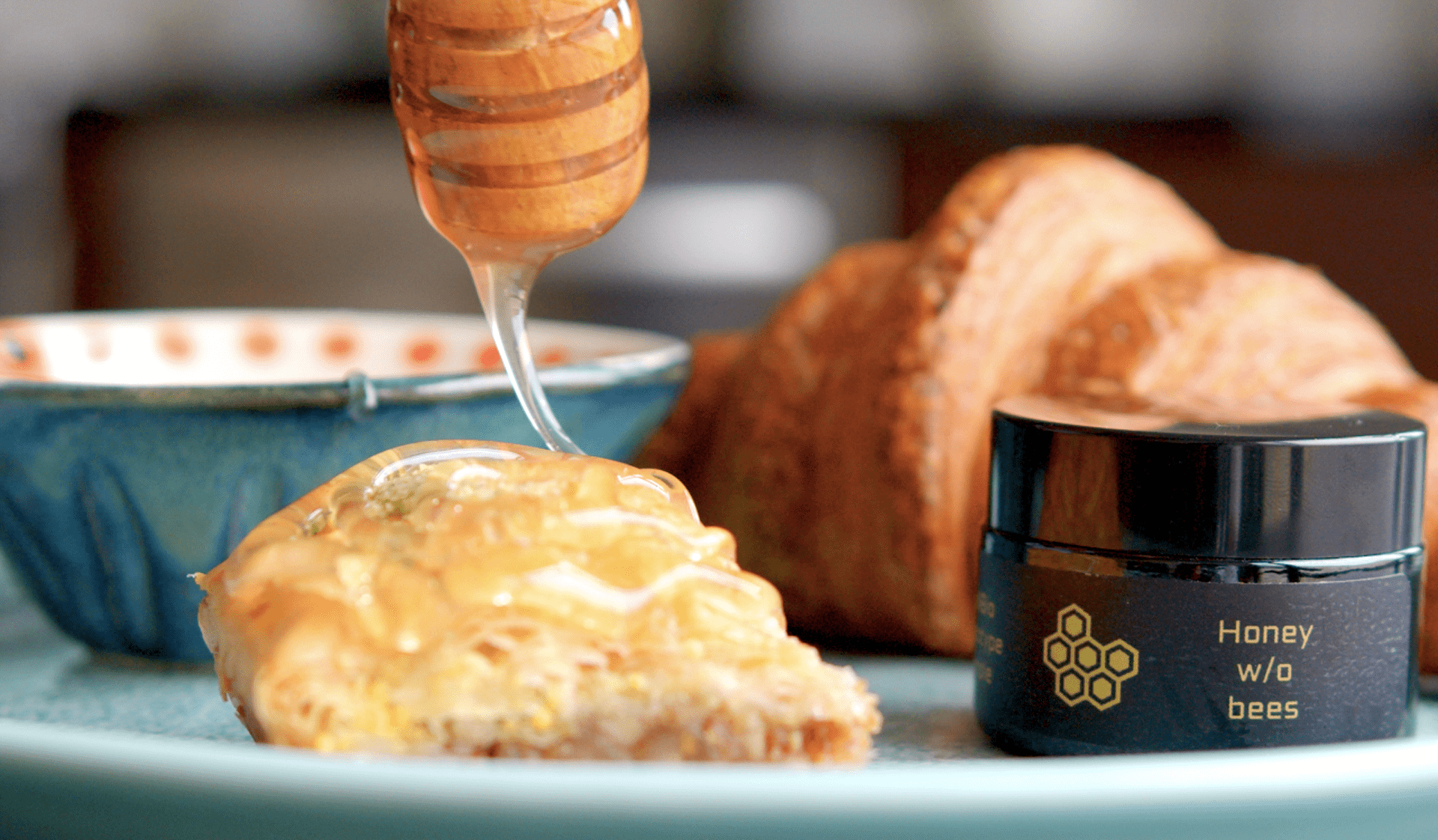MeliBio is giving bees a break from honey production. This Oakland, California company, headed by Serbian CEO Darko Mandich, has been in the vegconomist news feed regularly since early 2021 and is busy with its mission to provide a 1:1 replacement for bee-made honey.
After MeliBio’s initial raise, the company revealed what it claims to be the world’s first real honey made without bees as a plant-based ingredient for B2B customers and food service, in October of last year. In March of 2022, MeliBio secured a further $5.7 million to commercialize its first line of bee-free honey. Since then it has begun partnering with fine dining restaurants, including the world-famous Eleven Madison Park.
We were overdue a chat with Darko to find out more about bee-free honey and his hopes for the future.

What is the story behind MeliBio?
MeliBio is creating a sustainable future for the $10 billion honey industry by giving bees a break from honey production.
We make this happen through a proprietary approach of turning plants into honey that made TIME’s Best Inventions 2021 list.
“MeliBio is creating a sustainable future for the $10 billion honey industry”
After spending almost a decade in the European honey industry with a track record of trading more than 10,000 tons of honey, I realized that my industry is unsustainable and that its reliance on honeybees as the sole medium of production is having a negative effect on wild and native bee species.

On top of that, the issues with climate change that causes lower yields of honey in recent honey crops paired with a complicated and broken supply chain and lack of quality control that allowed pesticides to be found in honey, I acknowledged that the industry is entirely broken and needs to be reimagined and reinvented. I was certain that my experience in the industry paired with my passion for sustainability will empower me to drive a change.
“the industry is entirely broken and needs to be reimagined and reinvented.”
In late 2020, I moved from Belgrade, Serbia to San Francisco and met Dr. Aaron Schaller, an American scientist, amateur chef and a sustainability enthusiast. We both realized that we make a strong founding team with complementary skills and knowledge, both passionate about bees, removing animals from food production and honey as a product. That’s how MeliBio was born.

How is Melibio made? How is fermentation utilized in the process?
MeliBio’s approach to making honey without bees is focused on the most important goal – to recreate our honey on a molecular level to match bee-made honey, just without the use of bees. We do that by utilizing plant science and adding a fermentation step that helps us mimic processes happening in honey bees’ honey stomachs.
“we are the world’s first company to take this approach in crafting the future of honey”
Essentially, our honey is made only from honey-native ingredients and we are the world’s first company to take this approach in crafting the future of honey.
What are the main issues with commercial bee farming?
Besides the main issue of commercial bee farming artificially adding honeybees as an invasive species that takes over territory from 20,000 wild and native bee species and therefore negatively affects our bee biodiversity, there are important concerns raised around ethics and how honeybees are being treated within commercial bee farming.

For example, there have been countless cases reported about honeybees being left without their honey entirely and being fed with low nutritional cocktails made of table sugar and water that gave them no chance to survive winter months.
Additionally, large beekeeping operations involving transporting bees across continents using big trucks or sometimes even airplanes, put local habitats at risk with a potential pathogen spillover that can happen. Looking into all of these aspects of commercial beekeeping, it is clear that this approach to making honey is not scalable and not sustainable, therefore is the need for approaching honey production with an alternative solution that is better for humans and for bees.
How does your sustainable honey contribute to bee species protection?
By inventing an alternative way to make honey without bees, we provide an opportunity for the industry to become sustainable by alleviating the pressure of commercial beekeeping on bee biodiversity. Honey is a product found in every product category across a supermarket, and all the companies out there using honey now have a chance to partner with us and play an important role in protecting our precious bees.

Can you give us an insight into the reactions you received from customers and chefs following your most recent cooperation with San Francisco’s BAIA restaurant?
We picked up on a usual sentence that comes out after chefs had a chance to taste our honey. They say: “It’s real honey!”
Hearing that feedback brings tremendous joy to our faces and big smiles. We are especially happy that chefs and culinary experts at places where we tested our product such as BAIA in San Francisco, Eleven Madison Park in New York and Little Choc and Butcher’s Daughter in Brooklyn think highly of our product and can’t wait for it to become commercially available in larger volumes.
“we are happy that we finally made honey that’s plant-based and vegan, while preserving the familiar taste”
Honey is such a versatile product on its own and a great ingredient to make both sweet and savory foods more diverse. That’s why chefs love it and we are happy that we finally made honey that’s plant-based and vegan, while preserving the familiar taste of this product and matching the nutrition that bees were able to achieve.

How can food service companies and chefs benefit from MeliBio in their menus?
Switching to MeliBio’s bee-free honey, food service operators and chefs can have a delicious and diverse sweetener that caters to everyone’s taste while being inclusive of plant-based and vegan consumers. Everyone in the industry taking our honey has a chance to turn into big heroes on a very important mission of protecting bees, and that’s something that consumers are starting to really care about.
“Our solution requires restaurants to make no compromise in terms of taste”
Our solution requires restaurants to make no compromise in terms of taste, nutrition, and 1:1 replacement in application compared to bee-made honey. Lastly, our honey is made in the US and that makes the supply chain way simpler than relying on foreign suppliers that can’t guarantee the level of quality and service that MeliBio promises.

Tell us more about the new collaborations planned for later this year.
Later this year we plan to expand the number of food service partners and make our honey available for commercial purchases. Next to that, we have over 50 companies from all over the world that signed up to join our waitlist and be among the first to be able to purchase our honey made without bees.
“we have over 50 companies from all over the world that signed up to join our waitlist”
We are proud to be a partnerships-first company and we are happy to connect with any company and restaurant looking into sourcing sustainable honey that has no restrictions across different consumer groups.
Where do you see MeliBio in five years?
In late 2027, I dream of MeliBio becoming one of the most impactful and influential food companies driving innovation that makes our planet alive, sustainable and inclusive of all the species that live on it. I am confident that the amazing team we have built will take us there. The future created by MeliBio is better for bees and for humans!





